As shabbas is coming in forty minutes (and counting), I'd figure I'd get in one posting today.
- I did, indeed, give away my one remaining guinea pig.
- I did laundry last night and have today been packing a lot of the laundry as I start my packing for leaving on Sunday morning (to go to Rochester for a classmate's wedding, following which, I will be flying out to Boston to go spend the next six weeks at the Summer Beit Midrash.
- I haven't yet finished cleaning my room :( but that's what I will be doing (all of) Saturday night.
- I haven't yet done anything with my dead hard drive, figuring I can do something that won't cost me a ridiculous amount of money, so I'm still holding on to it.
Shabbat shalom
שבת שלום
A blog in which Drew Kaplan describes recent goings-on in his life, Jewish stuff, musings on life, etc.
30 June 2006
28 June 2006
Rambam and Sleep, Part 2: Sleep in "The Guide for the Perplexed"
Prior to Passover this year, I had looked into Rambam's "Guide of the Perplexed" (using Pines' version (no, I don't know Arabic, so, yes, I used an English translation)) for statements on sleep (although I have posted on my interest in sleep, I'm thinking it might be somewhat incomplete, therefore I hope ot post again on that). As I had mentioned nearly half a year ago, I started to look at Maimonides' conception(s) of sleep, as this is also fertile ground for an article (though I need to work on what I can do for now and return to this later) and have posted on some of my findings earlier.
Here is what I found:
Also, I think section 2.43 (on p. 391 of the Pines version (vol. 2)) also has something about dreams and awakening.
What's interesting is that all of the statements about sleep are found in the first section of the Guide, but none in the first, and only one sort of related to sleep in the third section. If anybody thinks I have overlooked any, feel free to point them out to me. Also, if you have anything in the Mishneh Torah, feel free to let me know, as well (though, I already indicated that most of them are to be found in the fourth chapter of הלכות דעות (hilkhos de'os)).
---------------------
Tags: sleep, Judaism, Jewish sleep study, Maimonides, Rambam, Moses ben Maimon, Moshe ben Maimon, Rambam and sleep
Here is what I found:
Accordingly, Midrash Qoheleth has the following text: When man sleep, his soul speaks to the angel, and the angel to the cherub (n. 28: Midrash Qoheleth, 10:20). Thereby, they have stated plainly to him who understands and cognizes intellectually that the imaginative faculty {265} is likewise called an angel and that the intellect is called a cherub. (2.6) (pp. 264-265)
In this way will he who wants to understand the prophetic riddles understand them. And he will awaken from the sleep of negligence, be saved from the sea of ignorance, and rise up toward the high ones. (2.10) (p. 273)
It is known that a matter that occupies a man greatly – he being bent upon it and desirous of it – while he is awake and while his senses function, is the one with regard to which the imaginative faculty acts while he is asleep when receiving an overflow of the intellect corresponding to its disposition. (2.36) (p. 370)
Now a men’s bed is not exactly his size, for it is not a garment, which one puts on. The bed is rather always bigger than the individual who sleeps on it. And the usual and well-known thing is for it to be longer than the individual by a third of his length. (2.47) (p. 407)
With regard to what is indispensable, like eating and drinking, he must confine himself to what is most useful and to what corresponds to the need for nourishment, not to pleasure. (3.8) (pp. 433-434)
Also, I think section 2.43 (on p. 391 of the Pines version (vol. 2)) also has something about dreams and awakening.
What's interesting is that all of the statements about sleep are found in the first section of the Guide, but none in the first, and only one sort of related to sleep in the third section. If anybody thinks I have overlooked any, feel free to point them out to me. Also, if you have anything in the Mishneh Torah, feel free to let me know, as well (though, I already indicated that most of them are to be found in the fourth chapter of הלכות דעות (hilkhos de'os)).
---------------------
Tags: sleep, Judaism, Jewish sleep study, Maimonides, Rambam, Moses ben Maimon, Moshe ben Maimon, Rambam and sleep
A J-Blogger Icon: Why Not Something Simple
 Over at the Jblogosphere blog (yes, it's a J-blog dedicated to J-blogging (against which Michael ranted), a recent post suggests a couple of icons for placement onto blogs. I think why I reject them (at least for myself - I'm not morally opposed to them, though) is that Judaism is important to me, though the land of Israel, while significant to Judaism, is not a significant part of my Judaism (in my living of it - that isn't to say that I don't care about it (speaking of which, tonight I just booked tickets to go to Israel for nearly two weeks during my winter vacation (man, am I "homesick" for Israel...I haven't been in two years, now))). So, when they justify the icons with the following
Over at the Jblogosphere blog (yes, it's a J-blog dedicated to J-blogging (against which Michael ranted), a recent post suggests a couple of icons for placement onto blogs. I think why I reject them (at least for myself - I'm not morally opposed to them, though) is that Judaism is important to me, though the land of Israel, while significant to Judaism, is not a significant part of my Judaism (in my living of it - that isn't to say that I don't care about it (speaking of which, tonight I just booked tickets to go to Israel for nearly two weeks during my winter vacation (man, am I "homesick" for Israel...I haven't been in two years, now))). So, when they justify the icons with the followingThose of us, who live in Israel are not isolated from the rest of the Jewish world. We in Diaspora, do care, and do think of Israel, and Israelis, as a nation (not just the Land, but the nation!) all the time. And for those of us, who live in Israel, we should not fall victims to illusion that once you become an Israeli, you forget about being a Jew.I don't think of the land or those living there all of the time - living a Jewish lifestyle and trying to have a God-consciousness are prime desiderata, not the land.
Anyways, feel free to use the icon in this posting (as long as you link back to this posting), though I would suggest something more jazzy.
------------------------
Tags: J-Blogosphere, J-Blogs, J-blogging, J-blog, Israel, Judaism
Some Tanakh Study
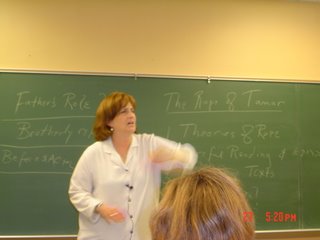 Yesterday, I attended the first day of the Yemei Iyun in Bible and Jewish Thought, run by YCT, in Teaneck, NJ. I went, just as I did last year, as student volunteer, helping people coming in register. Last year, there was a rotation of a few volunteers, so we would miss some classes to help at the registration desk each of the three days of the conference. This year, when I got there, I found out another student and I would be helping out with the main influx of people, and perhaps a little bit afterward, as there would be a staff member at the table the rest of the time. Although this would mean yesterday would be my only day at the conference (unless I wanted to pay for today and tomorrow), (not as I had planned) this would give me more time to finish up cleaning my room, etc.
Yesterday, I attended the first day of the Yemei Iyun in Bible and Jewish Thought, run by YCT, in Teaneck, NJ. I went, just as I did last year, as student volunteer, helping people coming in register. Last year, there was a rotation of a few volunteers, so we would miss some classes to help at the registration desk each of the three days of the conference. This year, when I got there, I found out another student and I would be helping out with the main influx of people, and perhaps a little bit afterward, as there would be a staff member at the table the rest of the time. Although this would mean yesterday would be my only day at the conference (unless I wanted to pay for today and tomorrow), (not as I had planned) this would give me more time to finish up cleaning my room, etc.Although I missed the first session to help at the desk, I ended up going to four other sessions. (If you are looking for links to recorded audio, there are none, though you can purchase cassette tapes of the presentations for $5 at the conference.) I went to Rabbi Hayyim Angel’s “Reward and Punishment in Tehillim”, Mrs. Rivy Poupko-Kletenik’s “The Rape of Tamar”, Rabbi Dr. Avraham Walfish’s “Structure and Meaning in Parshat Mishpatim”, and Rabbi Shalom Carmy’s “Joshua’s Two Farewell Speeches – Chapters 23-24”.
I had never met Rabbi Angel before, but I’ve found that he’s written quite a few articles on
 תנ"ך (including one in the same issue of the JBQ as my first published article), so it was a treat to sit in on that class.
תנ"ך (including one in the same issue of the JBQ as my first published article), so it was a treat to sit in on that class.I had last sat in on a class from Mrs. Poupko-Kletenik a few years ago when I attended CAJE 28 on women saying קדיש (kaddish). Her class was interesting, though the topic is so rich with material that it was a bit rushed. Nevertheless, it was certainly helpful in gaining an insight on how one might teach the topic (or similar topics, for that matter (most immediately, the Dinah story comes to mind)). One thing that was quite salient to me was that men and women view rape rather differently and that there are certainly gynocentric and androcentric perspectives to the topic.
Rabbi Walfish’s was interesting, as he showed similar lexical usages of terms after the עשרת דברים (lit., ten things or statements, but usually called the Ten Commandments) corresponding with the original set.
Rabbi Carmy’s presentation focused on showing the differences between the last two chapters in the book of Joshua, which was helpful in approaching what might otherwise seem a redundancy with them.
Also, I purchased a few books, myself, before leaving.
Okay, now back to cleaning, etc.
---------------------------
Tags: summer, summer 2006, YCT, Yeshivat Chovevei Torah, Tanakh, Tanakh Study, Yemei Iyun in Bible and Jewish Thought, YCT Yemei Iyun in Bible and Jewish Thought
27 June 2006
Guinea Pig Give-Away
 Whereas I will be heading to Boston for the next six weeks; and
Whereas I will be heading to Boston for the next six weeks; andWhereas I will not be bringing my one remaining guinea pig with me to Boston; and
Whereas I will not be leaving the responsibilities of taking care of my guinea pig to my remaining roommates,

I hereby invite anybody who is interested in taking my guinea pig (preferably before shabbas) to please e-mail me (Drewkaplanis@yahoo.com) and we can work out particulars, though I don't plan on charging money for it (they cost about $20-25 per guinea pig at the pet store on 181st Street), and you can even have my guinea pig stuff, too.
I made it ten months with this guinea pig, hopefully it will last its new owner much longer. :)
26 June 2006
"Shalom in the Home" Season 1 Wrap-Up
 So, tonight was the tenth and final episode of the first season (maybe there will be future seasons) of Rabbi Shmuley Boteach's show on TLC called "Shalom in the Home". I've already posted about the show mid-season (here and here), so I won't go into the mechanics of the show nor of my interest in this posting (also, Washington Post article about the show).
So, tonight was the tenth and final episode of the first season (maybe there will be future seasons) of Rabbi Shmuley Boteach's show on TLC called "Shalom in the Home". I've already posted about the show mid-season (here and here), so I won't go into the mechanics of the show nor of my interest in this posting (also, Washington Post article about the show).Reb Shmuley's main thrust generally seems to be that the parents are the focus of the family - they are the cornerstones of the family. Several episodes seem to start off with the parents saying their kids are either out of control, not happy, etc. Then Reb Shmuley comes on and starts showing the parents how they are performing as parents as well as how they parent based on themselves. Aha! They don't realize that the problem isn't their children's, per se, but rather something stemming from themselves. Two of Reb Shmuley's aphorisms (or Shmuleyisms) on this idea are the following (from the Shmuleyisms page):
You cannot have healthy children without having a healthy family environment.Also today (Monday), I missed Reb Shmuley being on Oprah's show, which was unfortunate,
There are no bad children. Only bad parents. When our kids act up, it’s time to look in the mirror.
 but fortunately, the Oprah Winfrey Show website posted on the show. Apparently, the family from the last episode was on (see 1, 2, 3, and 4), as well as one from another episode (1, 2, and 3) (in addition to two others not from the show).
but fortunately, the Oprah Winfrey Show website posted on the show. Apparently, the family from the last episode was on (see 1, 2, 3, and 4), as well as one from another episode (1, 2, and 3) (in addition to two others not from the show).Reb Shmuley is certainly an interesting figure (I was reading up about him today online (there was a certain article that I just tried googling from about 6-7 years ago about him that was somewhat extensive) (albeit during the Oprah Show) and find him to be interesting.) - one particular line sticks out to me (from another article on him, "Who is Shmuley Boteach?" from five years ago):
To get Jews interested in the Jewish world, you have to get the non-Jews interested. The Jews will follow what the non-Jews are doing.As the article immediately points out, most Orthodox Jews certainly don't agree with this point of view. Nevertheless, it's a smart point, though the mechanics of it need to be worked out. When he says "Jewish world", I think he's meaning the Torah, but I could be off.
Anyways, I was happy with the show and enjoyed its ten episode run for its inaugural season and hope to see more Reb Shmuley.
---------------------
Tags: Rabbi Shmuley Boteach, Shmuley Boteach, Shmuley, Reb Shmuley, Shalom in the Home, marriage and family therapy, family therapy, kiddush hashem, Oprah, Oprah Winfrey, Oprah Winfrey Show
23 June 2006
Who is a Wealthy Person?
The idea for this posting has been laying around for a few months now, so I figured I'd get it off of my head.
Many Jews are aware of Ben Zoma's famous statement (mAvos 4.1) that describes admirable traits of people, going through wisdom, strength, wealth, and honor and taking them out of their normal social context and putting them into a religious framework, citing Scriptural proofs for each of them. The one upon which I am focusing here is his on wealthiness:
Anyways, that's fairly well known. But when I came across a beraisa on Shabbas 25b, I learned of other tannaitic perspectives:
To me the only one that sticks out in this text is Rabbi Akiva's statement, as the other three are all clearly indicative of wealth. Perhaps a woman of fine actions is found in the upper levels of society and one must be wealthy enough to be with the in-crowd. Otherwise, it sticks out, which probably is so.
In my estimation (no, I haven't done research on this topic, though I'm sure it's something about which people have written already - who knows? maybe Prof. Tirosh-Samuelson wrote about it in her book on Jewish happiness), Ben Zoma wasn't arguing with the other sages in going about estimating wealth, but rather showing a different angle to it. Yes, there are practical considerations to determining one who is wealthy, but there is also a more democratic and personal lesson to everybody: Even if someone isn't wise, strong, wealthy, or honored as society may have it, one may still be so in the light of Scripture. (Who knows? Maybe I will expand upon this one day in a derasha.)
---------------------------
Tags: Judaism, Judaism, Jewish, happiness, Jewish happiness, wealth, Jewish wealthiness, Ben Zoma, Rabbi Akiva, Rabbi Tarfon, Rabbi Meir, Rabbi Yose
Many Jews are aware of Ben Zoma's famous statement (mAvos 4.1) that describes admirable traits of people, going through wisdom, strength, wealth, and honor and taking them out of their normal social context and putting them into a religious framework, citing Scriptural proofs for each of them. The one upon which I am focusing here is his on wealthiness:
One further interesting thing that Ben Zoma does is to notice the seeming redundancy with the latter part of the statement and bifurcate the timing of the goodness.איזהו עשיר? השמח בחלקו, שנאמר "יגיע כפיך כי תאכל אשריך וטוב לך." 'אשריך' בעולם הזה, 'וטוב לך' לעולם הבאWho is it that is wealthy? One who rejoices in his portion, as it is said (Ps. 128.2), "When you will eat of the labor of your hands, you shall be happy and it will be good with you." 'you shall be happy' - in this world; 'and it will be good with you' - for the world to come.
Anyways, that's fairly well known. But when I came across a beraisa on Shabbas 25b, I learned of other tannaitic perspectives:
איזה עשיר?
כל שיש לו נחת רוח בעשרו דברי רבי מאיר
רבי טרפון אומר כל שיש לו ק' כרמים ומאה שדות וק' עבדים שעובדין בהן
רבי עקיבא אומר כל שיש לו אשה נאה במעשים
רבי יוסי אומר כל שיש לו בית הכסא סמוך לשולחנוWho is a wealthy person?
"Anybody who has pleasure (or comfort) in his wealth," the words of Rabbi Meir.
Rabbi Tarfon says, "Anybody who has 100 vineyards, 100 fields, and 100 servants who are working in them."
Rabbi Akiva says, "Anybody who has a wife pleasant in actions."
Rabbi Yose says, "Anybody who has a bathroom (or a privy) close to his [eating] table."
In my estimation (no, I haven't done research on this topic, though I'm sure it's something about which people have written already - who knows? maybe Prof. Tirosh-Samuelson wrote about it in her book on Jewish happiness), Ben Zoma wasn't arguing with the other sages in going about estimating wealth, but rather showing a different angle to it. Yes, there are practical considerations to determining one who is wealthy, but there is also a more democratic and personal lesson to everybody: Even if someone isn't wise, strong, wealthy, or honored as society may have it, one may still be so in the light of Scripture. (Who knows? Maybe I will expand upon this one day in a derasha.)
---------------------------
Tags: Judaism, Judaism, Jewish, happiness, Jewish happiness, wealth, Jewish wealthiness, Ben Zoma, Rabbi Akiva, Rabbi Tarfon, Rabbi Meir, Rabbi Yose
22 June 2006
Todizzle
For the regular readers of my more Jewish content, this may disappoint, as it's more Drew-ey content.
----------------
Today was productive: I got a whole bunch of my room cleaned up (aside from my table and desk that I had accomplished clearing off earlier), which is my main occupation this week. My main feat tomorrow will be filing a massive amount of papers and articles away... (may God help me). Hopefully by shabbas, I will have a cleaner room than when I moved my stuff in more than eight months ago (Yay!).
After being productive on the home-front, I went down to pick up my computer with replaced hard drive (yes, it was dead) (but not after dropping a few Benjies - hard drives don't come cheaply). I had to ask for my dead hard drive, otherwise I might not have gotten it. The crazy thing is if I want some sort of data retrieval performed on it, it's going to cost some more, perhaps multiple times what I dropped today (scary, eh?).
Anyways, that's what's major today.
More Jewish postings on the way....
----------------
Today was productive: I got a whole bunch of my room cleaned up (aside from my table and desk that I had accomplished clearing off earlier), which is my main occupation this week. My main feat tomorrow will be filing a massive amount of papers and articles away... (may God help me). Hopefully by shabbas, I will have a cleaner room than when I moved my stuff in more than eight months ago (Yay!).
After being productive on the home-front, I went down to pick up my computer with replaced hard drive (yes, it was dead) (but not after dropping a few Benjies - hard drives don't come cheaply). I had to ask for my dead hard drive, otherwise I might not have gotten it. The crazy thing is if I want some sort of data retrieval performed on it, it's going to cost some more, perhaps multiple times what I dropped today (scary, eh?).
Anyways, that's what's major today.
More Jewish postings on the way....
21 June 2006
But, Seriously, Folks, I Am Not The Voice of YCT
I didn't quite finish my series on figuring out exactly the point, the nature, and the direction of my blog - or, for that matter, my blogging. I don't know that I will, per se, actually finish it, but it's at least a work in progress. I imagine that around my one-year blog anniversary, I will do a state-of-the-blog thing or something. In any event, I wanted to add on to my figuring out a voice posting (more below in a second section after this YCT stuff).
During the last week of classes, a fellow student remarked to me about my blogging on behalf of the yeshivah (hopefully, I've roughly paraphrased him correctly), as I will comment here or there on various blogs concerning us or organizing the YCT Chevre blog and, of course, regarding what is on my personal blog (you're here!). I remarked to him that I hadn't thought of it that way, and then wasn't sure about my thoughts on the matter. I then realized that I'm just trying to be honest and fair - certainly in going to bat when I can for the yeshivah elsewhere, and most certainly on my blog. The point of the YCT Chevre blog is for information regarding the yeshivah to be more easily disseminated, as well as some information which people wouldn't otherwise know, hopefully giving it a more alive face (as opposed to brochures, for instance (but don't get me wrong, brochures fulfill their own unique purpose, though)).
One of the great strengths of the blogosphere and Internet is its easy access - it's not an elitist thing, per se. Yes, I am invested in blogging (time-wise, not financially), but that doesn't mean others (other בני ישיבה (members of the yeshivah)) can't pitch their two cents in from time to time wherever. Also, I find that when the yeshivah is under attack from commenters (on, say, not the Godol haDor's blog (even though he probably isn't against the yeshivah), for instance), there are some people who do stand up for YCT who are neither attend nor are affiliated with YCT.
+ + + +
Another matter concerning voice is that of how I use it within the particular medium. One thing I have found with regards to the medium of blogging is the nature of discourse. While there are many ways in which this is carried out, the JBlogosphere often entails some specific ways. One way is trying to show off new things, ideas, or ways of looking at things - we'll call it generating novellae (making חידושים, for those more Hebraically inclined); while another is a more abrasive manner in which people are scathing. While the latter may be one thing with regard to an intellectual discussion regarding ideas, I have found that it often can easily run over into a character attack or personal insults hurled at another. On my blog, alone, I find that people hiding behind an anonymous moniker often get away with such hurling of insults, let alone when I try to enter my two cents in a discussion elsewhere. This is why I have put up the "Jewish Bloggers for Responsible Speech Online" icon on my blog, though I already mentioned this a few weeks ago. Although there have been times when I would have liked to have started an anonymous Jewish single guy blog or an anonymous Jewish blog and then not have people attacking me, that might be a way out, but every time I consider that, it would be weird for me as I wouldn't get recognition for it. I know that may sound self-centered, but.... As far as the former I definitely got swept up in it in the winter, but have been trying to calm down and trying to sound more rabbinic in a way - not rabbinic in the form of "I'm a rabbi" rabbinic, but more stylistically informal kind-of (it's late, what do you expect?). Okay, now that it's late and I've got to go to sleep, good night and God bless.
------------------------
Tags: YCT, Yeshivat Chovevei Torah, JBlogosphere, blogosphere
During the last week of classes, a fellow student remarked to me about my blogging on behalf of the yeshivah (hopefully, I've roughly paraphrased him correctly), as I will comment here or there on various blogs concerning us or organizing the YCT Chevre blog and, of course, regarding what is on my personal blog (you're here!). I remarked to him that I hadn't thought of it that way, and then wasn't sure about my thoughts on the matter. I then realized that I'm just trying to be honest and fair - certainly in going to bat when I can for the yeshivah elsewhere, and most certainly on my blog. The point of the YCT Chevre blog is for information regarding the yeshivah to be more easily disseminated, as well as some information which people wouldn't otherwise know, hopefully giving it a more alive face (as opposed to brochures, for instance (but don't get me wrong, brochures fulfill their own unique purpose, though)).
One of the great strengths of the blogosphere and Internet is its easy access - it's not an elitist thing, per se. Yes, I am invested in blogging (time-wise, not financially), but that doesn't mean others (other בני ישיבה (members of the yeshivah)) can't pitch their two cents in from time to time wherever. Also, I find that when the yeshivah is under attack from commenters (on, say, not the Godol haDor's blog (even though he probably isn't against the yeshivah), for instance), there are some people who do stand up for YCT who are neither attend nor are affiliated with YCT.
+ + + +
Another matter concerning voice is that of how I use it within the particular medium. One thing I have found with regards to the medium of blogging is the nature of discourse. While there are many ways in which this is carried out, the JBlogosphere often entails some specific ways. One way is trying to show off new things, ideas, or ways of looking at things - we'll call it generating novellae (making חידושים, for those more Hebraically inclined); while another is a more abrasive manner in which people are scathing. While the latter may be one thing with regard to an intellectual discussion regarding ideas, I have found that it often can easily run over into a character attack or personal insults hurled at another. On my blog, alone, I find that people hiding behind an anonymous moniker often get away with such hurling of insults, let alone when I try to enter my two cents in a discussion elsewhere. This is why I have put up the "Jewish Bloggers for Responsible Speech Online" icon on my blog, though I already mentioned this a few weeks ago. Although there have been times when I would have liked to have started an anonymous Jewish single guy blog or an anonymous Jewish blog and then not have people attacking me, that might be a way out, but every time I consider that, it would be weird for me as I wouldn't get recognition for it. I know that may sound self-centered, but.... As far as the former I definitely got swept up in it in the winter, but have been trying to calm down and trying to sound more rabbinic in a way - not rabbinic in the form of "I'm a rabbi" rabbinic, but more stylistically informal kind-of (it's late, what do you expect?). Okay, now that it's late and I've got to go to sleep, good night and God bless.
------------------------
Tags: YCT, Yeshivat Chovevei Torah, JBlogosphere, blogosphere
Beginning of Bava Mezia
Something that some of us in my class ('09) will be undertaking is learning the first forty pages of Bava Mezi'a in the Babylonian Talmud. This is in addition to what I will be doing this summer (including cleaning up my room this week). I was trying to think about blogging about it, then I thought maybe it'll be too boring for people to read about. Time will tell - most likely, I'll blog whenever something seems interesting enough to mention, rather than systematically describe it.
--------------------
Tags: Blogging Bava Mezia, Bava Mezia, Bava Metzia, Summer 2006, Talmud
--------------------
Tags: Blogging Bava Mezia, Bava Mezia, Bava Metzia, Summer 2006, Talmud
This Week
Throughout this year, I have been pushing off writing articles that I had hoped to write in the hopes that I would be able to focus and concentrate on writing them in the summer. And, indeed, that was the plan up until recently. However, as I have found someone to sublet my spot for July, I needed to clean up my room. Okay, I should have my room cleaned up, anyways. That's another thing which I have been putting off, but mainly due to being tired and not really wanting to deal with the mess. So, it's been accumulating, so this week is the best week of the year in my schedule to tackle this mess. Fortunately, my computer being in the shop this week (I received confirmation that the hard drive was dead) has been much less of a distraction to my cleaning up than otherwise would have been.
As far as writing articles goes, I may still get one or two done, but we'll see. I was thinking about one of the last lines in my favorite book of תנ"ך (Hebrew Bible), Koheles (see Dor-Shav's article for what made this my favorite book of תנ"ך to far and away my favorite book of the Hebrew Bible):
One other thing: this whole computer not working thing is kind of annoying (in many ways), but now I'm behind in catching up in my Bloglines subscriptions. I can only check e-mail, blog, and check other blogs when using others' computers.
As far as writing articles goes, I may still get one or two done, but we'll see. I was thinking about one of the last lines in my favorite book of תנ"ך (Hebrew Bible), Koheles (see Dor-Shav's article for what made this my favorite book of תנ"ך to far and away my favorite book of the Hebrew Bible):
This antepenultimate line in Koheles (Eccl. 12.12) fits in well with the rest of the existential views espoused in the work: why bother with making so many books if one is going to merely get wearied from such endeavor? Why not just enjoy the here and now? However, while I agree with this thought, there is, I think, a tension with setting out thought or information, etc. This is something about which I have been kind of thinking, but I realize writing articles has not only an intellectual contribution to society, etc., but also adds to one's resume (or CV or whatever), which can help. Anyways, I hopefully will still write.וְיֹתֵר מֵהֵמָּה, בְּנִי הִזָּהֵר: עֲשׂוֹת סְפָרִים הַרְבֵּה אֵין קֵץ, וְלַהַג הַרְבֵּה יְגִעַת בָּשָׂרAnd in addition to these, my son, be careful: The making of many books, there is no end; and much study is a weariness of the flesh.
One other thing: this whole computer not working thing is kind of annoying (in many ways), but now I'm behind in catching up in my Bloglines subscriptions. I can only check e-mail, blog, and check other blogs when using others' computers.
19 June 2006
Uh-Oh - My Hard Drive Might Be Dead
Although I have had computer problems before (see here (and here) and here (and here)), that was simply a matter of my computer overheating and such. However, this time it's different. As I was checking e-mail (and for a local Blockbuster), my computer froze - which, for a PC is normal (see new Apple ad (though there's a funny counter-clip). However, when I restarted it, it started giving me bad messages and clicking. It didn't seem good. So I took it into the place where I had taken it the previous two times and the guy at the counter guessed that the hard drive might be bad. Sooooooo that means ALL of my files are no longer - boo! BOO! Fortunately, I think that, for the most part, I can move on, even though there's a lot of pictures, especially, as well as some files that would have been good to have, but I will have to move on if that is the case. It wasn't even like I could have known to back up my computer, as I wasn't having any problems and then, without any warning, my computer goes kaput. Darn. OH well.
18 June 2006
Derech Reunion Shabbaton 2006
This past שבת, I went to Kew Garden Hills for a reunion of where I went to spend my first stint of learning in Israel (see my education page for more) - Derech. Aside from sleeping, the whole shabbaton was held at Yesvhiva Chofetz Chaim. It was the third annual reunion of Derech, the first having been in Far Rockaway two years ago, which I attended, and the second being also in Kew Garden Hills, which I missed as I went back to Columbus for a bat mizvah.
Let me say at the outset that it was a fine time. One thing that struck me the first time was that the group is somewhat self-selecting in that it's largely yeshivish, whether people are learning in yeshivos now or are in YU, and it was also true this time, as well (though I heard that last year's group was a bit more diverse). In any event, it was interesting to respond to people about which yeshiva I attend and pretty much nobody had heard of it, which was kind of interesting.
Of course, the best thing about reunions is seeing people one knew from years back and I did, indeed, enjoy that. Also, Rabbi Nachy Brickman, who runs the program (okay, so he's probably the only one there who knew anything about my yeshiva) was enjoyable the whole time. Among the things that went on was (just like at the first reunion (don't get me wrong, it's a good idea)) there were different breakout sessions Shabbas afternoon - one for married men, one for dating guys, one for single guys who aren't dating, and one for the wives. Rabbi Brickman ran the one for dating guys and had some pretty good tips to give, including that when guys get engaged, other guys often seek the newly-engaged guy on tips - but, what Rabbi Brickman said, was that one should really be asking people who've been married for years about these things, not recently-engaged guys. There were other good things, but I'll leave it at that for now.
An interesting thing that Rabbi Brickman said towards the end of shabbas was that us people learning in yeshivos, or even who have learned in yeshivos, are somewhat at the top as far as being learned Jews. I don't think he meant it any sort of we're-better-than-you-are sort of way, but rather a recognizing of oneself, such as, for example, how one conducts oneself. He also mentioned about שנאת חינם (commonly translated as 'baseless hatred') and that Jews, especially frum Jews, shouldn't needlessly look down upon one another, as we are all Jews, and lead an observant lifestyle, etc. As we was speaking this point, I was thinking about being a Modern Orthodox Jew among this crowd and hoping that a lot of the yeshivishe guys would get this message about not looking down upon their fellow observant brethren.
Lastly, it occurred to me that, as I was there for only four months (a half-year) rather than being there for the full one or more, my experience was rather different than a lot of others', in addition to my having been in college for a year already, rather than having come straight out of high school. So, my connection with the program and the guys might not have been as strong as most of the other guys'. I reflected somewhat on this during the shabbas, and may eventually write up about my experience.
-----------------------------
Tags: Derech, Derech Institute, Rabbi Brickman, Derech reunion
Let me say at the outset that it was a fine time. One thing that struck me the first time was that the group is somewhat self-selecting in that it's largely yeshivish, whether people are learning in yeshivos now or are in YU, and it was also true this time, as well (though I heard that last year's group was a bit more diverse). In any event, it was interesting to respond to people about which yeshiva I attend and pretty much nobody had heard of it, which was kind of interesting.
Of course, the best thing about reunions is seeing people one knew from years back and I did, indeed, enjoy that. Also, Rabbi Nachy Brickman, who runs the program (okay, so he's probably the only one there who knew anything about my yeshiva) was enjoyable the whole time. Among the things that went on was (just like at the first reunion (don't get me wrong, it's a good idea)) there were different breakout sessions Shabbas afternoon - one for married men, one for dating guys, one for single guys who aren't dating, and one for the wives. Rabbi Brickman ran the one for dating guys and had some pretty good tips to give, including that when guys get engaged, other guys often seek the newly-engaged guy on tips - but, what Rabbi Brickman said, was that one should really be asking people who've been married for years about these things, not recently-engaged guys. There were other good things, but I'll leave it at that for now.
An interesting thing that Rabbi Brickman said towards the end of shabbas was that us people learning in yeshivos, or even who have learned in yeshivos, are somewhat at the top as far as being learned Jews. I don't think he meant it any sort of we're-better-than-you-are sort of way, but rather a recognizing of oneself, such as, for example, how one conducts oneself. He also mentioned about שנאת חינם (commonly translated as 'baseless hatred') and that Jews, especially frum Jews, shouldn't needlessly look down upon one another, as we are all Jews, and lead an observant lifestyle, etc. As we was speaking this point, I was thinking about being a Modern Orthodox Jew among this crowd and hoping that a lot of the yeshivishe guys would get this message about not looking down upon their fellow observant brethren.
Lastly, it occurred to me that, as I was there for only four months (a half-year) rather than being there for the full one or more, my experience was rather different than a lot of others', in addition to my having been in college for a year already, rather than having come straight out of high school. So, my connection with the program and the guys might not have been as strong as most of the other guys'. I reflected somewhat on this during the shabbas, and may eventually write up about my experience.
-----------------------------
Tags: Derech, Derech Institute, Rabbi Brickman, Derech reunion
16 June 2006
Returning From the Conference & End of My School Year
After getting back from the conference on "Modern Orthodoxy 1940-1970" sponsored by the Judaic Studies program at the University of Scranton, co-sponsored by Edah (about which I posted in six installments: 1, 2, 3, 4, 5, 6), I headed off to my last Elman class. I will, at some point, be posting some highlights of the course (maybe next week(?)), but will just leave it at that, for now. (Interestingly, he mentioned to someone after class about blogs and suggested checking a few: Hirhurim, not the Godol Hador (though he warned him about that, but nevertheless, it is thoughtful), and a third one which I seem to have forgotten. He said he does so to better understand what's going on out there - with which I most certainly agree.) He then mentioned Gil's recent posting about what R' Schacter said about Talmud criticism, but said R' Schecter might not have been saying that about Academic Talmud, per se.
After that, I finally felt like that was the end of my school year, even though our last day of school was a week ago, as I had an assignment due on Wednesday, so now I can look forward to working on an article or two (about which I shall be posting on Sunday (I think)). So, yay!
-----------------------------
Tags: Talmud, Academic Talmud, Academic Study of Talmud, Talmud Study
After that, I finally felt like that was the end of my school year, even though our last day of school was a week ago, as I had an assignment due on Wednesday, so now I can look forward to working on an article or two (about which I shall be posting on Sunday (I think)). So, yay!
-----------------------------
Tags: Talmud, Academic Talmud, Academic Study of Talmud, Talmud Study
Blogging the Modern Orthodoxy Conference, Part 6: Thursday Morning
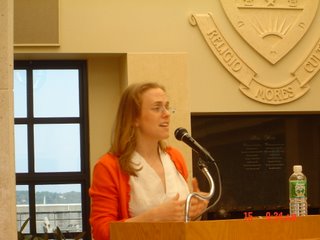 (For the first three posts from Tuesday, see here, here, and here (respectively). For the two posts from Wednesday, see here and here (respectively).)
(For the first three posts from Tuesday, see here, here, and here (respectively). For the two posts from Wednesday, see here and here (respectively).)Thursday morning of the conference began with two presentations: one by Dr. Miri Freud-Kandel on "Anglo-Jewish Orthodoxy in Transition: 1960-1970" (focusing on the Jacobs Affair) and one by Dr. Rabbi Lawrence Kaplan on "Introductions to Judaism of Isadore Epstein, Aron Barth, Herman Wouk, and Eliezer Berkovits: Why Alexander Littman Was Wrong" (unfortunately, my recording
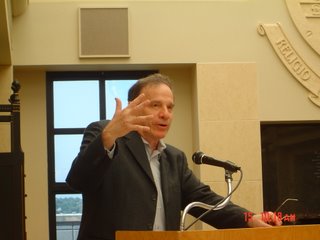 device ran out of battery juice (unbeknownst to me until after the speech), so it cuts out during his speech and the comments section is missing). One interesting line that follows directly after Dr. Freud-Kandel's lecture prior to the rest of the comments was said by David Singer:
device ran out of battery juice (unbeknownst to me until after the speech), so it cuts out during his speech and the comments section is missing). One interesting line that follows directly after Dr. Freud-Kandel's lecture prior to the rest of the comments was said by David Singer:The Hertz Chumash is a British import. People who, like me, went to Yeshiva College in the 1960s who were crazy enough to care about Modern Orthodoxy, we were always bewailing the fact "Why is it that American Jewry could not produce something like the Hertz Chumash?" And, of course, we all know - I try to be fair and objective and scholarly, but at the personal level - this has has been now replaced by Artscroll. Which, to its credit, takes care of a vacuum. Of course, it's a tremendous indictment to Modern Orthodoxy.This last comment reminded me
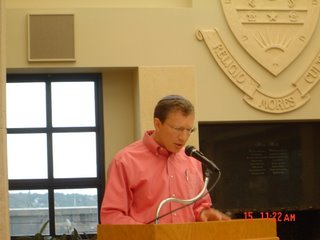 of something I heard in passing in school about one day creating a Modern Orthodox Humash, though I don't know how soon something like that will come about. Maybe someone with the interest, the know-how, and the time will be able to come up with that work, but it has yet to come out.
of something I heard in passing in school about one day creating a Modern Orthodox Humash, though I don't know how soon something like that will come about. Maybe someone with the interest, the know-how, and the time will be able to come up with that work, but it has yet to come out.After these two, the conference moved into the last set of speeches, entitled "Formative Events of the 1960's". The first of these was given by David Landes on "The Birth of the Modern Orthodox Clinic: Modernity and Medicine" (unfortunately, having run out to get a battery for my recording device, the first few minutes are missing). The second by Adam Ferziger on "Modern Orthodoxy and the Soviet Jewry Movement." Responding to Rabbi Yehudah Mirsky's question concerning a relationship to the kiruv movement, Dr. Ferziger said the following about Modern Orthodoxy and the kiruv movement:
Number one, the Modern Orthodox who once championed kiruv, did it at the same time as they did Soviet Jewry; and at the same time as they sort of lost their passion in these types of activities, they also lost their passion for kiruv, because they becameThe last was given by Josh Teplitsky on "Modern Orthodoxy and the Vietnam War."survivalist and they started worrying about their own inner problems and didn't have time for everybody else, which is part of the problem.
The second point is that the more interesting aspects of kiruv today, in terms of modernity and the influence of modernity, are davka in the haredi world. And its the haredi world which, because of their interaction with as kiruv workers with nonobservant jews have begun to live in these community kollels...and are being then influenced by their own surroundings, bringing their own chilren up in these - Atlanta, Phoenix, and San Jose, that there, you see interesting issues of passion and post-denominationalism sort of begin to emerge.
Following the last set of speeches came a go around the room seeking comments and suggestions. One of the most interesting comments came from Rabbi Yehudah Mirsky who, in response to a comment about the lack of negativity during the conference, he said that we were talking about only up until 1970, "it's still humble and moral." It certainly helped me gain a better understanding of Modern Orthodox history - it seemed
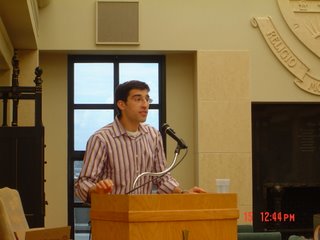 that there was a turn for Centrist Orthodoxy, though I'm now left on not really being clear on what went wrong in the last few decades in Modern Orthodoxy. Daniel Statman suggested a more diverse audience in attendance, including more non-Modern Orthodox Jews and non-Jews, as well. Another point made was by Rabbi Ariel Picard about defining domains, such as sociological and philosophical (such as theory of halakhah). A couple of people had pointed to the greater need for looking at what was going on more on the ground. One suggestion I have for that is to see how the greater suburbanization in the post-war era had on this element of life. Lastly, Hanoch ben Pazi suggested a greater look at how the Conservative movement might have affected Modern Orthodoxy.
that there was a turn for Centrist Orthodoxy, though I'm now left on not really being clear on what went wrong in the last few decades in Modern Orthodoxy. Daniel Statman suggested a more diverse audience in attendance, including more non-Modern Orthodox Jews and non-Jews, as well. Another point made was by Rabbi Ariel Picard about defining domains, such as sociological and philosophical (such as theory of halakhah). A couple of people had pointed to the greater need for looking at what was going on more on the ground. One suggestion I have for that is to see how the greater suburbanization in the post-war era had on this element of life. Lastly, Hanoch ben Pazi suggested a greater look at how the Conservative movement might have affected Modern Orthodoxy.--------------------------------
Tags: American Modern Orthodox Judaism, Edah, University of Scranton, Modern Orthodoxy, Modern Orthodoxy Conference, historiography, Judaism, history, Orthodox Judaism, American Modern Orthodoxy, Jacobs Affair, English Jewry, Louis Jacobs, Isadore Epstein, Aron Barth, Herman Wouk, Eliezer Berkovits, Artscroll chumash, Hertz chumash, Soviet Jewry movement, Vietnam war, Artscroll
14 June 2006
Blogging the Modern Orthodoxy Conference, Part 5: Wednesday Afternoon
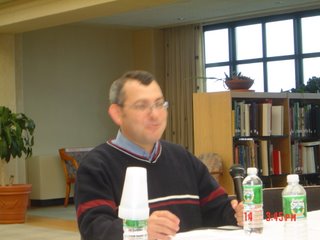 (This posting is the second posting of Wednesday's conference on Modern Orthodoxy (sponsored by the Judaic Studies program of the University of Scranton co-sponsored by Edah), as a continuation of the first. Tuesday's postings: first, second, and third.)
(This posting is the second posting of Wednesday's conference on Modern Orthodoxy (sponsored by the Judaic Studies program of the University of Scranton co-sponsored by Edah), as a continuation of the first. Tuesday's postings: first, second, and third.)After lunch, the afternoon was dedicated to "'Modern Orthodoxy' in Israel" (I added the extra marks around Modern Orthodoxy, as Modern Orthodoxy in Israel is not quite the same phenomenon as it is in America whence it originated). The first speaker was Prof. Benjamin Brown speaking on "Three 20th Century Jewish Political Theologies: Torah State, Halakhic Democracy and Da'at Torah." An interesting perspective on da'at Torah was offered by Rabbi Yehudah Mirsky:
If we think in terms of Weberian forms of authority, I think that one of the things that strikes me about da'as torah is the manner in which it is presented. The second thing is what [?] said before that it seems to be the substition of charismatic for rational authority. I mean, all rabbinic authority is traditional authority, so that base is always covered. ... I really liked how you (Brown) defined political theology at the outset; I thought that it was a really excellent, important definition. And then, in precisely those terms, I'm not sure that da'as torah on its own terms works, because it seems to me to be, to the extent to which it's theological, it's a blueprint not for a social or political order, but for the organization of one sub-culture within a larger political order to which it's dialectically-related. ... The idea of choosing within da'as torah, I think the identities within it are still rather ascriptive.The second was Prof. Arye Edrei on "A Priest Anointed For War: Rabbi Shlomo Goren and the Re-Invention of the Jewish Military Tradition." The last of the afternoon was Rabbi Ariel Picard, who spoke on
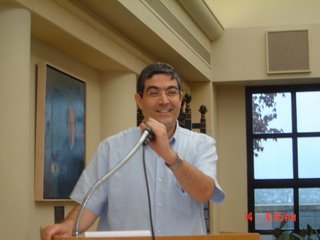 "Rabbi Ovadya Yosef, from Jerusalem to Cairo and Back: Sociology and Halakhic Policy." From this last one, I have two quotes I would like to mention. The first one is from Dr. Rabbi Alan Brill on the popularity of Rav Ovadia Yosef:
"Rabbi Ovadya Yosef, from Jerusalem to Cairo and Back: Sociology and Halakhic Policy." From this last one, I have two quotes I would like to mention. The first one is from Dr. Rabbi Alan Brill on the popularity of Rav Ovadia Yosef:It's not the fate of who he is, it's the function that a legal decider who gives leniencies plays for a Modern Orthodox community. Modern Orthodox tend to gravitate toward deciders who are lenient regardless of what their ideology is. And there's a relationship there that treats him as a product being used by others. For example, right now there is the Lakewood-trained posek Rav Abadi, who is now becoming the darling of the Open Orthodox communities in America because he is lenient. It says nothing about his ideology....The next one was said by Dr. Kurt Anders Richardson (a Christian theologian who spoke before I arrived on Tuesd
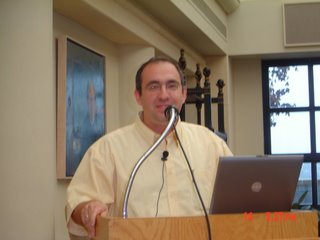 ay and provides some interesting insights from a different perspective) regarding one aspect of Church-State interplay among people:
ay and provides some interesting insights from a different perspective) regarding one aspect of Church-State interplay among people:In the United States, the "Godless Constitution", as it is called, doesn't, however, carry any secularist ideology, either. There is no code of values installed in the Constitution other than the human rights of the Bill of Rights, etc. and the amendments. It must be remembered that the First Amendment is not a Church-State separation amendment, it is a religious liberty amendment, so that wherever the religious laws do not conflict with the constitutionally developed legislation, you're completely free to regulate yourself, but on a voluntary basis. So, the rebbe, the priest, the pastor is going to be very frustrated.(See also the previous posting about what he had to say on the American religious experience, in general.)
After the last speech, we davened מנחה (afternoon prayer service) and then had dinner - end of day (well, blogging, of course).
----------------------
Tags: Edah, University of Scranton, Modern Orthodoxy, Modern Orthodoxy Conference, historiography, Judaism, history, Orthodox Judaism, American Modern Orthodoxy, Religious Zionism, da'as torah, da'at torah, Rabbi Shlomo Goren, Rav Ovadia Yosef, Rabbi Ovadia Yosef, Ovadia Yosef, Open Orthodoxy, Rabbi Abadi, Constitution, religion in America, Church-State, US Constitution, Bill of Rights, First Amendment, Freedom of Religion, Israel, Israeli Modern Orthodoxy
Blogging the Modern Orthodoxy Conference, Part 4: Wednesday Morning
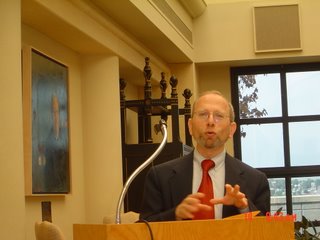 (This posting is the first of my postings today on the conference on Modern Orthodoxy: 1940-1970 Judaic Studies program of the University of Scranton, co-sponsored by Edah. Yesterday's postings: first, second, and third.)
(This posting is the first of my postings today on the conference on Modern Orthodoxy: 1940-1970 Judaic Studies program of the University of Scranton, co-sponsored by Edah. Yesterday's postings: first, second, and third.)The first lecture today was given by Prof. Jonathan Sarna on "The Break Between Conservative and Orthodox in America." It was followed up by a brief response by Prof. Marc Shapiro and one by Prof. Benjamin Brown (if you know of a link for him, let me know). An interesting quote was where he mentioned YCT in passing during the discussion following his speech:
What interests me is when do you have institutions that shape a different movement and when not. Thus, for example, will we one day say because you have Chovevei Torah and Yeshiva University, they will have to increasingly distinguish themselves from one another and we will look back and say institutions created two different religious movements and Orthodoxy split? I don't know. In other words, when does it happen and when does it not happen? I am not sure that the difference between the Seminary and YU, in its early days, was seen as different than between Chovevei Torah and Yeshiva University. And it remains to be seen what the implications are. I think that it's one of these rules where sometimes it happens and sometimes it doesn't happen. And therefore, we have to figure out why....The next set of talks were entitled
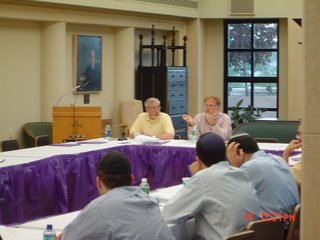 "Religious Zionism in America: The Creation of an Education System," the first of which was given by Rabbi Yehudah Mirsky on "The New Heavens in the New World: The Religious Hebraism of Samuel K. Mirsky" (who was his grandfather). A quote towards the end of his speech which I found interesting was
"Religious Zionism in America: The Creation of an Education System," the first of which was given by Rabbi Yehudah Mirsky on "The New Heavens in the New World: The Religious Hebraism of Samuel K. Mirsky" (who was his grandfather). A quote towards the end of his speech which I found interesting wasFor some while I've been thinking that maybe the comparatively static category of Modern Orthodoxy might better be re-thought as what I sometimes refer to as modernizing Orthodoxy - a range of ideological and social groupings arrayed around or clustering around certain shared beliefs and practices.The second speech was given by Moshe Sokolow on "The Educational Philosophy of Hirschenson and Religious Zionism." During the discussion following the speech, Kurt Anders Richardson (a Christian theologian who spoke before I arrived yesterday and who provides some interesting insights into various points), made an interesting point regarding religious practice in America:
American religious vitality keeps demonstrating itself through various forms of mediated experience. And probably most supremely, the Paulline claim that if you walk by the spirit of God, you will fulfill the law of God, is very, very important for the American experience. What's interesting is that traditionalism of any kind cannot gain traction because there has never been an operative tradition - juridical or ritual - of American religious experience.The third, and final of the morning, was given by Rabbi Alan Yuter on "The Halakhic Approach of Rabbi Emmanuel Rackman." Unfortunately,
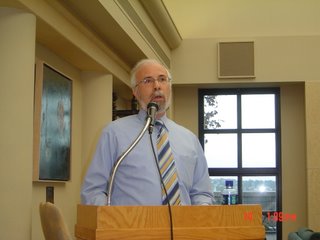 as you can tell from the audio file, he was not feeling well, so his session was bumped up from being scheduled tomorrow. One thing that was neat about his presentation was that he quoted his son, which slightly surprised me, but was certainly appropriate. One quote that jumped out at me was
as you can tell from the audio file, he was not feeling well, so his session was bumped up from being scheduled tomorrow. One thing that was neat about his presentation was that he quoted his son, which slightly surprised me, but was certainly appropriate. One quote that jumped out at me wasHe (Rackman) asks rhetorically, "How can the rabbis justify their arrogance?" Now, when I hear that kind of idiom, I'm reminded that type of idiom is often used in the Jewish Observer in their critique of people who inhabit those realms of Orthodoxy that are to the left of themselves. It's a retort with whom Rackman is sparring. Consequently, he's the first Modern Orthodox rabbi that I have found to refer to the right-wing Orthodox approach not as 'fervently Orthodox,' - because that means those to the left are not fervent - but as heretics, apikorsim - you got the Torah wrong.... Their heresy - his word, not mine - is that they regard their own Biblical and Talmudic interpretations as canonized in the same measure as the texts themselves, which was never true.Following the above lectures, we broke for lunch.
One thing that struck me about the style of discussion upon a paper (in addition to the first) was that it seemed very much like a blog - someone puts something out there which isn't that dynamic but puts some ideas out on the table, then people jump in and a discussion ensues. I now
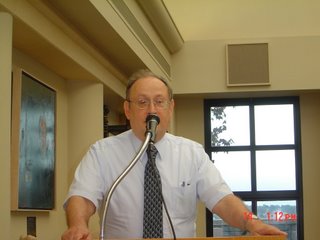 understand what Menachem meant when he typed that it would "be a lot of fun." However, once I started pondering it, I started realizing the numerous vast differences between the two forums of dialogue and discourse. The first is that there is a cap on the length of discussion due to time constraints, whereas the discussion on the Internet can continue and continue (although after some time, only some people actually stay around and keep discussing). A second is that at a conference, people can see each other, get an idea of their personalities, and recognize their humanity versus not seeing people, not interacting directly, and the worst of all, people can be anonymous and subject people to attacks. A third (there are probably more, but I will stop for now) is that at a conference, there are people who are some of the most advanced in their fields and are tremendously knowledgeable, whereas anybody can speak up on a topic on the Internet. However, the last point actually can be positive in that there is a greater amount of accessibility for the masses to the information rather than attending a conference. Nevertheless, a conference is certainly neat for the sharing of ideas, information, as well as cross-pollination of ideas (although this is mainly where there is a more diverse crowd), etc.
understand what Menachem meant when he typed that it would "be a lot of fun." However, once I started pondering it, I started realizing the numerous vast differences between the two forums of dialogue and discourse. The first is that there is a cap on the length of discussion due to time constraints, whereas the discussion on the Internet can continue and continue (although after some time, only some people actually stay around and keep discussing). A second is that at a conference, people can see each other, get an idea of their personalities, and recognize their humanity versus not seeing people, not interacting directly, and the worst of all, people can be anonymous and subject people to attacks. A third (there are probably more, but I will stop for now) is that at a conference, there are people who are some of the most advanced in their fields and are tremendously knowledgeable, whereas anybody can speak up on a topic on the Internet. However, the last point actually can be positive in that there is a greater amount of accessibility for the masses to the information rather than attending a conference. Nevertheless, a conference is certainly neat for the sharing of ideas, information, as well as cross-pollination of ideas (although this is mainly where there is a more diverse crowd), etc.---------------------------
Tags: Edah, University of Scranton, Modern Orthodoxy, Modern Orthodoxy Conference, historiography, Judaism, history, Orthodox Judaism, Conservative Judaism, American Modern Orthodoxy, Rabbi Samuel Mirsky, Samuel Mirsky, Rabbi Hayyim Hirschenson, Hayyim Hirschenson, Religious Zionism, Rabbi Emmanuel Rackman, Emmanuel Rackman, YCT, Yeshivat Chovevei Torah, YU, Yeshiva University, JTS
Subscribe to:
Comments (Atom)